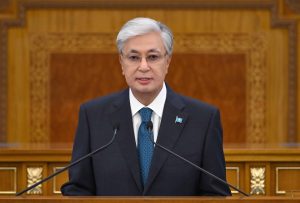On September 8, Kazakh President Kassym-Jomart Tokayev delivered his annual address to the nation before the Kazakh parliament. In a wide-ranging speech, Tokayev touched on topics as varied as artificial intelligence, electric scooters, inflation, nuclear power development, the scandalous behavior of women, and the need to shift to a unicameral parliament via a future constitutional referendum.
“The world has entered a new historical era, which will obviously not be easy for all of humanity,” Tokayev began his speech. After charting out the world’s difficulties – a crisis in the “Western concept of multiculturalism, interethnic and interreligious harmony,” the shaking of the foundations of “national cultures and traditions” by “globalist destructive forces” and myriad migration crises – he said that “a new world order is coming.” His main mission, Tokayev said, was “to ensure stable socio-economic development and security of Kazakhstan in this turbulent, dangerous time.”
The president remarked that “thanks to the large-scale transformations carried out in recent years, our political system has become more progressive and open” but added that “there is still a lot of work to do to modernize society.”
At the end of his speech, Tokayev honed in on restructuring parliament as the next step in the country’s political development. He set 2027 as a probable time for a constitutional referendum. Calling it a “serious issue,” Tokayev warned against “haste” in considering his proposal to create a unicameral parliament – effectively ditching the Senate in which he served for a decade before becoming president.
The case for a unicameral parliament is rooted in the fact that the Senate isn’t a directly representative body. Forty of its 50 members are indirectly elected by delegates from the 17 provinces and three national cities; the remaining 10 are nominated by the president. None of the members of the Senate represent political parties. Proponents of the change argue that it will strengthen political parties.
Tokayev ascended to the presidency in 2019, following the surprise resignation of Nursultan Nazarbayev, precisely because he was the sitting chair of the Senate. A snap presidential election was held in June 2019, which confirmed Tokayev’s control of the office. At the time, Kazakh presidential terms were five years and limited to two terms, with first president Nazarbayev exempted from the term limit. A June 2022 constitutional referendum, among other things, removed language referring to Nazarbayev as “elbasy” or “leader of the nation”; shrunk the lower house of the parliament, the Mazhilis, from 107 members to 98; and diminished, somewhat, presidential power. In his September 2022 address to the nation, Tokayev called for an early presidential election and pledged to sign legislation limiting the president to a single seven-year term.
“Seven years is a sufficient period to implement any ambitious program,” he claimed.
Later in September 2022 those amendments were signed into law and in November 2022 Tokayev secured a single seven-year presidential term. Supposedly, under the current laws, he will leave the presidency in 2029. Unless, of course, the constitution is changed again.
Tokayev wouldn’t be the first Central Asian president to tinker with the rules in order to reset the clock on his terms.
In comments to RFE/RL, Kazakh political scientist Dimash Alzhanov suggested this was exactly the gambit.
“The amendments to the Constitution will most likely pursue the goal of updating the presidential terms… We do not yet know the full list of [planned] changes. But under the pretext of amending the Constitution to create a unicameral parliament, they can quietly push through more important changes, such as, for example, resetting the presidential term or introducing the position of vice president,” he said.
Alzhanov is also not convinced that a unicameral parliament will effective strengthen political parties.
“Parties will become independent when the regime changes and democratization begins. The speaker of parliament may receive powers, but they will be formal and will not threaten the power of the president,” he said.
The need to strengthen political parties is a long-running conversation, but it remains true that one party has long dominated the arena – Amanat (formerly Nur-Otan), the de facto presidential party. Amanat holds 62 of the lower house’s 98 seats. Attempts by new political parties to attain registration – required to contest elections – have usually failed, especially if the party professes an “opposition” stance.
As I’ve written previously:
In recent years, Kazakh authorities have reformed the registration requirements for political parties, for example by lowering of the party registration threshold from 40,000 members to 20,000 in 2020 and then again to 5,000 in 2022. But it was only after the 2022 snap presidential election that the country’s Justice Ministry registered two new parties, Baytak, a green party, and Respublica, which The Diplomat’s Paolo Sorbello remarked was “a party without a clear political agenda that looks more like a publicity stunt by its founders.”
We’ll have to wait and see what comes of Tokayev’s initiative to reform the parliament into a unicameral body, and whether the administration will try to use the occasion to reset the presidential clock or generate alternative pathways for Tokayev to retain power (perhaps as prime minister in a newly reformed parliament).
The most radical and progressive thing Tokayev could do would be to leave the presidency as scheduled in 2029 and not try to retain a position of direct influence. In all of Central Asia, only Kyrgyzstan’s Almazbek Atambayev and his direct predecessor, interim President Roza Otunbayeva, have ever left the presidential office on schedule.

































